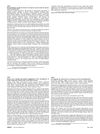Investigating the Effectiveness of Treatments Used in Trichotillomania
April 2016
in “
Journal of The American Academy of Dermatology
”
alopecia areata intralesional corticosteroid injections vellus hairs follicular streamers catagen hairs telogen hairs lymphocyte infiltration polytrichia telogen effluvium vitamin and mineral supplement hair density hair strength hair volume trichotillomania cognitive behavioral therapy psychotropic medications light therapy AA TE TTM CBT

TLDR Different treatments are effective for hair loss conditions, but results vary by individual factors.
The document presents findings from three separate studies on treatments for different hair-related conditions. The first study evaluated histopathologic prognostic factors in 97 patients with alopecia areata (AA) treated with intralesional corticosteroid injections. It found that the presence of vellus hairs, follicular streamers, catagen, and telogen hairs were associated with a favorable response to treatment at 3 months, while lymphocyte infiltration around muscle and polytrichia indicated a poor prognosis at 6 months. The second study involved 39 Brazilian women with telogen effluvium (TE) and assessed the effectiveness of a vitamin and mineral supplement over 12 weeks. The results showed a significant reduction in telogen hair shedding and improvements in hair density, strength, and volume, with 89.8% of cases showing clinical improvement. The third study retrospectively reviewed the cases of 9 adult patients with trichotillomania (TTM) and found that cognitive behavioral therapy (CBT) and psychotropic medications were effective treatments, with the addition of light therapy being beneficial for one patient with a complex psychiatric history. Overall, these studies suggest that various treatments can be effective for AA, TE, and TTM, but individual prognostic factors and treatment responses may vary.




